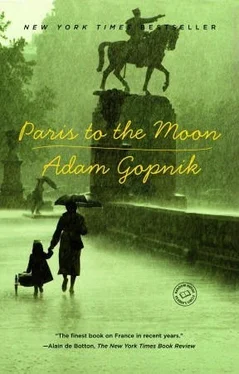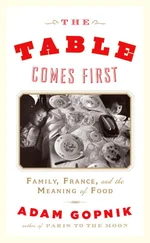Above all, they were offended by the very existence, the very idea, even in a purely hypothetical form, of Terence Conran. “I wouldn’t go to England and give them lessons on making tea,” one of them said, bitterly. Lorenzo, I thought, looked unsettled.
It was around that time that I finally went to have lunch with J.-P. Qu6lin, the biting food critic of Le Monde. I was almost, though not quite, an official emissary from the friends of the Balzar to him, hoping that he would tone it down a little. We went to Aux Fins Gourmets, the Basque bistro downstairs from our apartment, where I have been going for several years now and where, to my surprise, Quelin had never been.
Quelin turned out to be from central casting. (But then we are all from central casting: I running down, without extra forethought, from the apartment, in sneakers and sweater and beige Levi’s, and at my age too.) He was wearing what I have come to think of as the Uniform, the standard gear of French journalists who still see themselves as men of letters: black and beige houndstooth jacket, white cotton shirt, black knit tie. He has a perfect hatchet face, a long jaw, a clear enunciation, and he smoked American cigarettes square in the middle of his mouth. He looked nearly exactly like Ian McKellen playing Richard III.
I came in, took my table, and noticed him, thinking, This can’t be J.-P. Quelin; he looks much too characteristic for that. But of course, it was, and he smiled, sardonically, and pointed: So it is you. He had invited along his editor, who turned out to be a lovely, worried-looking, square-built blonde—a mum (French writers and their editors, Frenchmen and their mums). He was brutal with the waiters and decided at last on haricot de mouton and a bottle of Madiran. I had sworn to have an omelette and no wine at all, but took the wine as a challenge to my—well, if not to my masculinity then to my Franco assimilation, my right to live in Paris and call myself a writer.
We talked about cooking and restaurants. “There is an Anglo-Saxon contempt for French food and a love for it all the same,” Jean-Pierre Quelin began. I tried, tactfully, to argue that while the top heights of French cuisine remain unique—Passard, Gagnaire—the everydays might be more pleasurable now in New York or even London. He was dubious about the second proposition but agreed about the first: They are cooking, he says, at a level of originality that defies judgment, defies criticism, defies the grammar of cuisine. (This, I think, is true. When I took my brother to L’Arpege for his birthday, we got fourteen [small] courses, mostly of vegetables— haricots verts with peaches and raw almonds dressed with basil and fresh mint; fresh shell beans with onion ravioli and tomato coulis—that made even the best of old cuisine look like sludge.)
We kept pouring the Madiran, and to my alarm, a second bottle followed the first. I saw the afternoons work disappearing. In voicing my own tentative criticisms of the state of French cooking—mild and commonplace—I realized that Quelin was completely insulated from the general opinion that the new Mediterranean synthesis that reigns in New York and London is simply the thing and that the French two-tier system—three stars for the millionaires and occasions; the same old same old forever elsewhere—is defunct. He just had never heard the idea. I didn’t even try to convince him otherwise, though, not that I could.
Quelin’s editor left and, the bottle still there, we began confiding—no, not confiding, engaging in that level of frank, let’s-call-a-Medusa’s-head-a-Medusa’s-head honesty that is one of the pleasures of the end of a two-bottle lunch in Paris. We shared philosophical reflections on our sons, our lives, the impossibility of journalism. “The voluptuous cruelty of filling pages,” he said, “the voluptuous cruelty of filling pages is what kills us.” We talked about his time in the army in Algeria, when a Breton peasant under his command tried to rape a local girl. He stopped him, and the peasant drew his revolver: “I looked death, in all its absurdity and horror, right in the face for fifteen minutes.” Then we talked about our sons. The day will come when they condescend to us, when they feel themselves to be our intellectual superiors, “and in that moment of pity we will find our pride.”
It occurred to me then that the paradoxes that litter French writing are deeply felt among all French literary people. The pity and pride of paternity; the absurdity and profundity of death, the voluptuous cruelty of journalism—these antinomies are not affectations but part of a real heritage of feeling. They mean it. In my heart, I suppose, I don’t believe that something can be horrible and beautiful; I am too American for that, though I suppose I believe that something can be voluptuous and cruel. A child of the occupation—his father escaped twice from prison camps, to see him as a baby—and the Algerian War, he knows in his blood that it is so, that life is damnably double, whichever way it falls. It may be an affectation, but it is not a pose.
Over the third bottle—a title for a French memoir—I tried out my pet theory: that France is marked by a struggle between its pompous official culture and its matchless vernacular, commonplace civilization—and that what makes France unique is that so much of the pompous, abstract, official culture has spilled over into the popular “culture,” so that every man sees himself as an aphorist, his own Montaigne in his own tower. He pointed at me again. “That,” he said dramatically, “is an idea of merit. You must write it up for us in the context of cuisine.” I said that I would try.
When the bill came, he handed the waiter his carte bleu and was told, as I knew he would be, that they don’t take cards. Without looking up again at the waiter, he reached into his wallet and handed him his Le Monde press card. “Send it to me,” he said icily, meaning the bill. The insolence was enormous. Not even an essay at a smile. Afterward, as we left, he searched out the thin, intellectual owner of the restaurant, Michel, who had been giving us the same indulgent, fixed half-smile for three years and told him that he admired his navarin. Michel looked at him with hungry gratitude and then at me with disbelief— this one brought this one?—and I looked back at him in quiet, sneaker-bound triumph.
That Wednesday I appeared in Quelin’s column in Le Monde, as a brave joyeusement americain who had introduced him to the bistro where they still know how to master the difficult art of the navarin, etc. Later on that year I even made a second appearance, at Quelin’s invitation, and under my own byline, explaining my theory about civilization and culture in France and even making a terrible French pun on the words moss and mass.
Quelin never again made fun of the friends of the Balzar, so I feel that this diplomatic negotiation had, at least, been well conducted. At the end of the lunch, though, I wasn’t just muzzy but absolutely knocked cold by the Madiran. I went back upstairs and slept for two hours.
And then it was over, all over by Christmas. One by one, the garcons each decided to take the “fat envelope” Bucher was offering them, and retire. They had to. There was nothing we could do. We walked into the Balzar one December evening, and everyone—Jean-Michel, Claude, Robert—was gone, gone for good. They had decided to take the fat envelope—just how fat it was I’m not sure, though it was said to be about a year’s salary, in addition, of course, to their pensions—and go. Only two of the old garcons remained. We had lost.
Guy, who remained, spoke to me under his breath, sadly, as we shook hands, defeated. “A handful of cherries,” he said softly. “They gave them a handful of cherries for a lifetime of work. What can I do? I want to work for a while longer.”
Читать дальше












